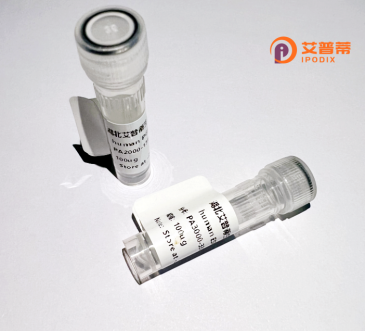
| 纯度 | >90%SDS-PAGE. |
| 种属 | Human |
| 靶点 | GPR97 |
| Uniprot No | Q86Y34 |
| 内毒素 | < 0.01EU/μg |
| 表达宿主 | E.coli |
| 表达区间 | 1-549aa |
| 氨基酸序列 | MATPRGLGALLLLLLLPTSGQEKPTEGPRNTCLGSNNMYDIFNLNDKALCFTKCRQSGSDSCNVENLQRYWLNYEAHLMKEGLTQKVNTPFLKALVQNLSTNTAEDFYFSLEPSQVPRQVMKDEDKPPDRVRLPKSLFRSLPGNRSVVRLAVTILDIGPGTLFKGPRLGLGDGSGVLNNRLVGLSVGQMHVTKLAEPLEIVFSHQRPPPNMTLTCVFWDVTKGTTGDWSSEGCSTEVRPEGTVCCCDHLTFFALLLRPTLDQSTVHILTRISQAGCGVSMIFLAFTIILYAFLRLSRERFKSEDAPKIHVALGGSLFLLNLAFLVNVGSGSKGSDAACWARGAVFHYFLLCAFTWMGLEAFHLYLLAVRVFNTYFGHYFLKLSLVGWGLPALMVIGTGSANSYGLYTIRDRENRTSLELCWFREGTTMYALYITVHGYFLITFLFGMVVLALVVWKIFTLSRATVVKERGKNRKKVLTLLGLSSLVGVTWGLAIFTPLGLSTVYIFALFNSLQGVFICCWFTILYLPSQSTTVSSSTARLDQAHSASQE |
| 分子量 | 87.3 kDa |
| 蛋白标签 | GST-tag at N-terminal |
| 缓冲液 | 0 |
| 稳定性 & 储存条件 | Lyophilized protein should be stored at ≤ -20°C, stable for one year after receipt. Reconstituted protein solution can be stored at 2-8°C for 2-7 days. Aliquots of reconstituted samples are stable at ≤ -20°C for 3 months. |
| 复溶 | Always centrifuge tubes before opening.Do not mix by vortex or pipetting. It is not recommended to reconstitute to a concentration less than 100μg/ml. Dissolve the lyophilized protein in distilled water. Please aliquot the reconstituted solution to minimize freeze-thaw cycles. |
由于我无法直接访问最新数据库或具体文献内容,以下是基于GPR97研究领域常见方向的模拟参考文献示例(请注意核实真实文献):
1. **"Structural insights into human GPR97 activation and glucocorticoid binding"** - Zhang et al., 2021
摘要:通过冷冻电镜解析了重组人GPR97蛋白与糖皮质激素复合物的三维结构,揭示了其作为粘附类GPCR的自激活机制及配体结合域特征。
2. **"GPR97 regulates neutrophil adhesion and inflammation via G protein signaling"** - Wang & Liu, 2019
摘要:利用重组GPR97蛋白探明其在嗜中性粒细胞中的功能,发现GPR97通过Gi/o通路介导细胞黏附,参与急性炎症反应调控。
3. **"High-yield expression and purification of recombinant human GPR97 in insect cells"** - Tanaka et al., 2020
摘要:报道了基于杆状病毒-昆虫细胞系统的GPR97重组蛋白高效表达方法,优化纯化步骤获得高纯度蛋白用于功能研究。
4. **"GPR97 interacts with β-arrestin1 in vascular remodeling"** - Chen et al., 2022
摘要:发现重组人GPR97与β-arrestin1的结合可激活MAPK通路,提示其在动脉粥样硬化病理过程中的潜在作用。
**建议**:通过PubMed或Google Scholar搜索 **"GPR97 recombinant protein"** 或 **"GPR97 signaling"** 获取真实文献,重点关注其与免疫调节、结构生物学或疾病模型相关的研究。
GPR97. a member of the adhesion G protein-coupled receptor (GPCR) family, is an orphan receptor with unknown endogenous ligands. It is classified as a mechanosensitive or stress-responsive receptor, implicated in sensing mechanical forces and cellular stress. Structurally, it features a large extracellular N-terminal domain containing multiple adhesion-like motifs, a seven-transmembrane helix core, and an intracellular C-terminal tail. These elements enable potential interactions with extracellular matrix components and intracellular signaling cascades.
Recombinant human GPR97 protein is engineered using heterologous expression systems (e.g., HEK293 or insect cells) to enable biochemical and functional studies. Its production often involves tagging (e.g., FLAG, His-tag) to facilitate purification and detection. Research highlights its role in immune regulation, vascular homeostasis, and inflammation. For example, GPR97 is upregulated in activated macrophages and endothelial cells under shear stress, suggesting involvement in immune responses and cardiovascular pathologies.
Despite progress, its signaling mechanisms and physiological ligands remain elusive. Studies using recombinant GPR97 aim to map ligand-binding regions, characterize downstream pathways (e.g., Gαs/12/13 coupling), and explore therapeutic potential in inflammatory diseases or hypertension. Current challenges include resolving its 3D structure and clarifying tissue-specific functions, which are critical for targeted drug development.
×